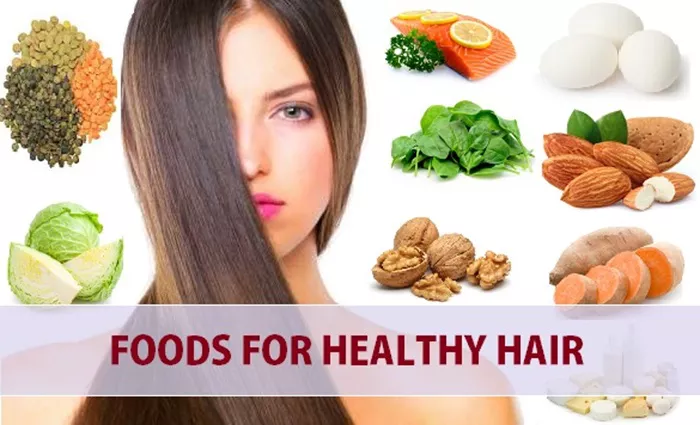Healthy, lustrous hair is often a reflection of overall well-being and proper nutrition. Just like the rest of your body, your hair needs essential vitamins, minerals, and proteins to grow strong and stay vibrant. While genetics and hair care routines play a role, your diet is one of the most significant factors influencing hair health. Nutrient deficiencies can lead to hair thinning, dryness, and even premature hair loss. Fortunately, incorporating the right foods into your diet can promote thicker, shinier, and more resilient hair.
3 Protein-Rich Foods for Strong Hair Structure
Hair is primarily made of a protein called keratin, which means that consuming enough protein is crucial for maintaining healthy hair growth. Without adequate protein, hair can become weak, brittle, and more prone to breakage.
Eggs are one of the best sources of protein and biotin, a B vitamin essential for hair growth. Biotin helps produce keratin, and a deficiency in this nutrient can lead to hair thinning. Eggs also contain zinc and selenium, which support scalp health.
Lean meats, such as chicken and turkey, provide high-quality protein along with iron, which helps red blood cells carry oxygen to hair follicles. Iron deficiency is a common cause of hair loss, particularly in women.
For vegetarians and vegans, legumes like lentils, chickpeas, and beans are excellent plant-based protein sources. They also contain iron, zinc, and folate, all of which contribute to healthy hair growth.
3 Healthy Fats for Shine and Scalp Health
Not all fats are bad—omega-3 fatty acids, in particular, are essential for maintaining a healthy scalp and preventing dryness. These fats cannot be produced by the body, so they must be obtained through diet.
Fatty fish, such as salmon, mackerel, and sardines, are rich in omega-3s, protein, and vitamin D. Omega-3s nourish hair follicles, reduce inflammation on the scalp, and add shine to dull hair.
Avocados are another great source of healthy fats, along with vitamin E, which acts as an antioxidant to protect hair from oxidative stress. Vitamin E also improves blood circulation, ensuring that hair follicles receive adequate nutrients.
Nuts and seeds, including walnuts, flaxseeds, and chia seeds, provide omega-3s, zinc, and selenium. Walnuts, in particular, contain biotin and vitamin E, making them a powerhouse for hair health.
4 Vitamins and Minerals That Boost Hair Growth
Several vitamins and minerals play a direct role in hair growth and strength. Deficiencies in these nutrients can lead to hair shedding and slow growth.
Spinach and leafy greens are packed with iron, folate, and vitamins A and C. Vitamin A helps sebum production, which keeps the scalp moisturized, while vitamin C aids in collagen production, strengthening hair strands.
Sweet potatoes are rich in beta-carotene, which the body converts into vitamin A. This vitamin promotes healthy sebum production, preventing dryness and flakiness on the scalp.
Berries, such as strawberries, blueberries, and raspberries, are loaded with antioxidants and vitamin C. Antioxidants protect hair follicles from damage caused by free radicals, while vitamin C enhances iron absorption and supports collagen synthesis.
Oysters are one of the best sources of zinc, a mineral that supports hair repair and growth. Zinc deficiency is linked to hair loss and a dry, flaky scalp. For those who don’t eat seafood, pumpkin seeds and chickpeas are good plant-based alternatives.
Hydration and Hair Health
While we often focus on solid foods, hydration is equally important for maintaining healthy hair. Dehydration can make hair dry, brittle, and more prone to breakage.
Water is essential for transporting nutrients to hair follicles and keeping the scalp hydrated. Drinking enough water ensures that your hair remains moisturized from the inside out.
Cucumbers and watermelon are high in water content and also provide silica, a trace mineral that strengthens hair and promotes thickness.
Foods to Avoid for Better Hair
Just as some foods promote healthy hair, others can contribute to hair problems. Excessive sugar, processed foods, and unhealthy fats can lead to inflammation, which may disrupt hair growth cycles.
Sugary foods and drinks can spike blood sugar levels, leading to insulin resistance, which has been linked to hair thinning.
Fried and greasy foods can clog hair follicles and lead to scalp issues like dandruff.
Alcohol dehydrates the body and can deplete essential nutrients like zinc and B vitamins, which are vital for hair health.
Conclusion
Achieving healthy, strong hair goes beyond just using the right shampoos and conditioners—it starts with what you eat. A diet rich in protein, healthy fats, vitamins, and minerals provides the building blocks for vibrant, resilient hair. By incorporating nutrient-dense foods like eggs, fatty fish, leafy greens, nuts, and berries, you can support hair growth from the inside out. Additionally, staying hydrated and avoiding excessive sugar and processed foods will further enhance your hair’s health. Remember, consistency is key—nourishing your hair with the right foods over time will yield the best results. So, the next time you plan your meals, think about how your choices will not only benefit your body but also your hair.
Related topics:
The 8 Best Fruits for Hair Growth: A Comprehensive Guide
The Best Exercises for Hair Growth: A Doctor’s Guide
What Are the 5 Best Hair Growth Gummies?


